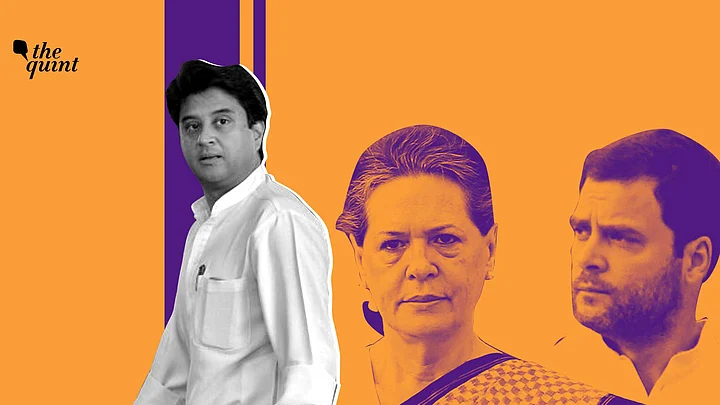Former Union Minister and Congress General Secretary Jyotiraditya Scindia’s defection to the BJP has sparked a debate within the grand old party. While a large number of Congress leaders and supporters accused Scindia of being a “traitor”, there were a few contrary voices who said the Congress could have handled the matter differently.
Rajasthan Deputy Chief Minister Sachin Pilot was the most prominent among these, tweeting, “I wish things could have been resolved collaboratively within the party”.
Another leader, actor-turned-politician Nagma, took Pilot’s statement forward and said, “There’s discontent among many of us but the party fails to see it”. She also alleged that leaders’ efforts are not being recognised.
Nagma further said there should be a balance between young and senior leaders.
She said this in response to All India Mahila Congress President Sushmita Dev’s tweet that the “young vs old narrative is a hollow one”.
Rajya Sabha MP PL Punia said that Scindia’s exit is “unfortunate” and that the party should introspect if “Scindia alone is responsible”.
However, several other party leaders took a different view by aggressively attacking Scindia. They made it clear that the fault lay with him and there’s no need for introspection.
Rajasthan CM Ashok Gehlot went to the extent of saying,“the sooner opportunists leave, the better”.
There are three aspects to the debate within the party and Scindia’s exit makes an impact on all of them.
1. Leadership: Where Does the Buck Stop?
The one reason that was given by Congress supporters to justify the Gandhi family’s continuance at the helm was that if the family isn’t there, the party will split.
With Scindia leaving, this premise is being challenged.
The argument now is that if Sonia Gandhi’s leadership couldn’t manage the differences between Scindia on the one hand and Kamal Nath and Digvijaya Singh on the other, this “glue” isn’t all that strong after all.
And unlike other recent defections, Scindia’s exit has ended up endangering an important Congress state government in Madhya Pradesh.
The solution that is being given is that either Rahul Gandhi should return as Congress president – after all, it was under his leadership that the Congress won Assembly elections in Madhya Pradesh, Rajasthan and Chhattisgarh.
But as Scindia was seen as being close to Rahul, his exit has weakened the latter’s case vis-a-vis senior leaders like Kamal Nath and Digvijaya Singh.
The alternative then is that in the near future, acting president Sonia Gandhi hands over the reins to Priyanka Gandhi or a senior party leader outside of the family.
2. Patronage: ‘What’s in it for Me?’ Leaders Ask
Politics is, at the end of the day, transactional. Fundamental reason for Scindia’s exit is that he felt he wasn’t being allowed to grow in the Congress any longer. This may not have been entirely justified – given that he became a Cabinet minister and a party general secretary at a fairly young age – but this was certainly his perception.
Sachin Pilot, PL Punia and Nagma’s tweets also indicate that many in the party feel that they aren’t getting what they consider is their due.
The root cause of this is that being out of power, the Congress’ ability to distribute patronage has significantly reduced over the last six years.
Unfortunately for most politicians, getting positions is the only way of “getting their due”.
Problem for the Congress is that the number of leaders to be accommodated is far, far more than the Rajya Sabha seats, Pradesh Congress chief posts, state minister posts, general secretaryships available.
And the second aspect of this is that in the absence of strong leadership, the party isn’t also in a position to promise leaders that their aspirations will be addressed some time in the near future.
The BJP, on the other hand, has immense resources from which it can distribute the fruit of power and influence.
3. Ideology: What Does the Congress Stand For?
The only positive consequence of Scindia’s exit for the Congress was that it made several Congress leaders assert the party’s ideology, especially in contrast to the BJP.
Responding to PL Punia’s tweet, Congress MP from Tamil Nadu’s Virudhnagar, Manickam Tagore, said that Scindia “chose personal interests over ideology and he seems to lack the stomach to fight RSS/Shah/Modi”.
Several other Congress functionaries and supporters asserted the party’s ideology and accused Scindia of betraying it.
However, there were a few, like Nagma, who said “it’s not about ideology but about recognition of one’s efforts”.
Then there are also those who are ideologically committed to fighting the BJP but aren’t happy in the Congress. In this category, there are the examples of former Jharkhand Congress chief Dr Ajoy Kumar and former Tripura unit chief Pradyot Manikya Debbarman, who left the Congress but joined AAP and stayed Independent respectively. They stayed away from BJP citing ideological reasons.
Why the Crisis May Not Entirely Be a Bad Thing
It is safe to predict that Scindia won’t be the last Congress leader to jump ship. There will always be someone or the other for whom the lack of rewards would outweigh “ideological” commitment or party loyalty.
The BJP on its part is working to demoralise Congress supporters and send the message that it isn’t a viable option for anyone who wants to grow.
However, this churn and debate within the Congress may not be a bad thing. Yes, it may lead to some more fragmentation. But it may also compel the party to address the leadership and ideology question and, more immediately, evolve a mechanism by which internal disputes can be resolved.
And if for some reason the Congress fails to get its act together, the resentment against BJP’s policies is significant and the Opposition vacuum can’t last forever. Sooner or later, an alternative Opposition force is likely to coalesce.
(At The Quint, we question everything. Play an active role in shaping our journalism by becoming a member today.)
